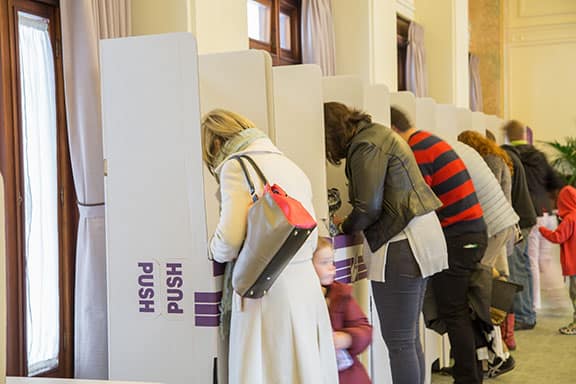Divya Nimmagadda is a student at Harvard Law School.
In the final stretch to election day, union members have been active in their campaigning activity and advocacy for the Harris-Walz ticket. A large part of the activity has been targeted towards other fellow union workers, and given that union workers make up 1 of every 5 voters in the key swing states of Michigan, Wisconsin and Pennsylvania, this campaigning may be critical to the election outcome. For example, the American Federation of Teachers involved hundreds of its members across the country to “canvass ‘labor doors.'” In a similar vein, the United Auto Workers has engaged in phone, text and mail campaigns as well as meeting workers at homes and worksites. Two days ago, Shawn Fain, president of the UAW, made a “final appeal” for the union’s members to go out and vote for Harris; in underscoring the importance of the election, he quoted past UAW president Walter Reuther: “‘[T]here’s a direct relationship between the ballot box and the bread box and what the union fights for and wins at the bargaining table can be taken away in the legislative halls.'” Other efforts have been focused on a wider audience, with UNITE HERE in Philadelphia targeting Black and Latino working-class voters and the SEIU setting a goal of knocking on a million doors in the final four days leading up to the election. There is evidence that the unions’ efforts are working – a recent UAW poll of 800 UAW member households in swing states showed “Harris holding a 29-point lead over Trump among those who reported hearing from the UAW about the election, compared to just a 6-point lead among those who said they’d not heard from their union.”
Also this past week, Lyft has agreed to pay $2.1 million in a settlement with the FTC for the company’s “deceptive earnings claims about how much money drivers could expect to make.” Lyft engaged in a systematic campaign of seemingly misleading promises about how much drivers would earn and driver promotions and incentives; the company has received thousands of complaints from drivers based on these statements. The deception was especially stark given that the drivers were “composed disproportionately of people for whom English is not their native language.” It is unclear if the $2.1 million fine will change the behavior of one of the top global ride-hail platforms.






Daily News & Commentary
Start your day with our roundup of the latest labor developments. See all
March 4
The NLRB and Ex-Cell-O; top aides to Labor Secretary resign; attacks on the Federal Mediation and Conciliation Service
March 3
Texas dismantles contracting program for minorities; NextEra settles ERISA lawsuit; Chipotle beats an age discrimination suit.
March 2
Block lays off over 4,000 workers; H-1B fee data is revealed.
March 1
The NLRB officially rescinds the Biden-era standard for determining joint-employer status; the DOL proposes a rule that would rescind the Biden-era standard for determining independent contractor status; and Walmart pays $100 million for deceiving delivery drivers regarding wages and tips.
February 27
The Ninth Circuit allows Trump to dismantle certain government unions based on national security concerns; and the DOL set to focus enforcement on firms with “outsized market power.”
February 26
Workplace AI regulations proposed in Michigan; en banc D.C. Circuit hears oral argument in CFPB case; white police officers sue Philadelphia over DEI policy.